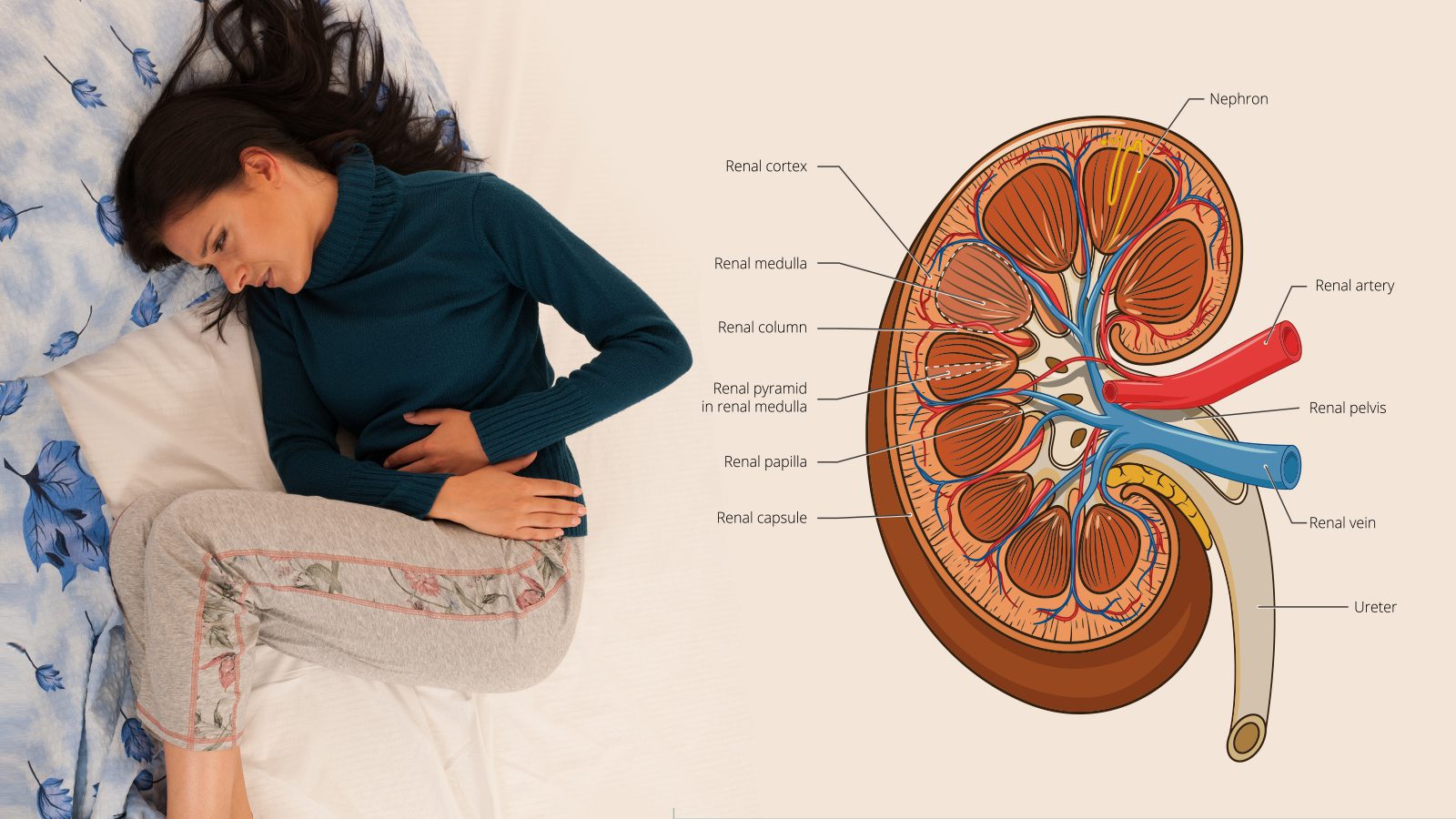Avoid kidney disease by knowing these symptoms.
Recognizing the signs that your body needs a kidney flush can help you take proactive steps to support kidney health and promote detoxification. A kidney flush requires eating and drinking specific foods and drinks that promote toxin elimination. But you must start by knowing the earliest signs of kidney disease or distress.
Your kidneys are vital to removing waste and fluids from your blood and maintaining good health. You might need a kidney flush if you consume an unhealthy diet, don’t drink enough water, or have medical conditions affecting your kidneys.
The process promotes overall health and helps prevent kidney disease and other complications. Healthy kidneys typically function fine without a cleanse, but there are some signs that a dietary change can help. The cleanse involves healthy food and drinks and restricts unhealthy ingredients to improve overall functioning.
Eleven Signs Your Body Needs a Kidney Flush
Kidney cleanse indicators can signal when you need to flush your kidney. You might experience symptoms of kidney congestion, signs of kidney disease, and other indications of an issue. Here are some of the complications to watch for:
1 – Frequent urination or increased urine output
Impaired kidney functioning can make you urinate more, interfering with maintaining fluid balance. It could indicate a lack of antidiuretic hormone, disrupting your kidneys’ ability to reabsorb fluid.
In other instances, hydronephrosis may cause frequent urination or increased urine output. It is the swelling of one or both of your kidneys because of a build-up of urine. This situation can occur for many reasons and likely requires medical attention.
Frequent urination and increased urine output can indicate kidney failure or disease. Experts explain that it can also occur because of acute kidney injury, including urethral stricture or bladder outlet obstruction.
2 – Dark-colored urine or strong-smelling urine
If you experience dark-colored or strong-smelling urine, it could be a sign your kidneys need attention. It often indicates dehydration, showing that you need more fluids. Kidney stones and chronic kidney disease can also cause these issues.
3 – Persistent fatigue or low energy levels
Research shows improperly functioning kidneys cause toxin build-up in your blood, resulting in fatigue and low energy. It can also disrupt red blood cell production, leading to anemia and causing you to feel exhausted or weak.
4 – Water retention or swelling in the body
Edema, or swelling, indicates an issue with maintaining fluid levels and is often uncomfortable. Water retention can cause swelling all over your body or occur locally, only affecting specific parts. It can also cause weight gain or shortness of breath.
5 – Difficulty concentrating or mental fog
If you have trouble focusing, remembering things, or frequently experience brain fog, it could be a sign of kidney complications. You might also feel confused sometimes. These issues can occur due to toxin build-up, anemia, and other kidney-related complications.
6 – Increased frequency of urinary tract infections
If you keep getting urinary tract infections (UTIs), it could indicate a kidney blockage. Leaving a UTI untreated can lead to a bacterial kidney infection that can cause many uncomfortable symptoms.
You might experience pain, nausea, vomiting, burning during urination, fever, and increased urination frequency. Sometimes you’ll also notice discolored or foul-smelling urine.
7 – Unexplained muscle cramps or pain in the lower back or sides
Having cramps or pain in these areas indicates kidney problems. Kidney pain varies, being sharp for blockages and dull for infections.
8 – High blood pressure or changes in blood pressure levels
If you have high blood pressure, it can signal that your kidneys aren’t functioning optimally. Kidney disease can result from long-term high blood pressure, so it’s essential not to ignore it.
9 – Skin issues such as dryness, itchiness, or breakouts
When your kidneys aren’t functioning optimally, the toxins in your blood build up and affect your skin. Toxin build-up can trigger dry or itchy skin and can lead to breakouts.
10 – Elevated levels of toxins in the body, as indicated by lab tests
Lab tests can help medical professionals determine what’s happening with your kidneys. These tests will show elevated toxin levels and help monitor build-up caused by dysfunction.
Lab tests check for urea and creatinine and can check kidney functioning. If any of these tests show issues, it’s a good sign you need a kidney flush.
11 – Decreased kidney function or impaired kidney health, diagnosed by a healthcare professional
If a healthcare professional diagnoses you with decreased kidney function or impaired kidney health, you might want to consider a flush. They can diagnose you through tests, a biopsy, or medical imaging. A lifestyle change to improve kidney health can slow the progression and reduce symptoms.
Importance of Kidney Flushes for Detoxification
If you identify any signs your body needs a kidney flush, it’s time to implement a change. Understanding the importance of kidney cleansing will help you address the issues and live a healthier life. Here are some of the kidney health benefits you’ll experience with a few lifestyle and dietary changes:
Removal of waste and toxins
Flushing your kidneys promotes excess fluid and toxin elimination from your body. With less waste and toxins present, it reduces your risk of bladder problems, infection, and discomfort. It also reduces other health risks and bodily dysfunction.
Improved kidney function
Flushing the kidneys can support their optimal functioning and promote overall kidney health. Your kidneys functioning is essential to balancing minerals and regulating blood pressure, making it a benefit. The improved function also helps correct hormonal imbalances caused by kidney congestion or disease.
Enhanced detoxification
Your body regularly eliminates toxins and waste and supports your natural detoxification processes. Flushing your kidneys promotes the process, easing your symptoms and helping you feel better.
Prevention of kidney stones
Regularly flushing your kidneys helps reduce your risk of kidney stones. It can prevent the pain and discomfort that accompanies kidney stones.
Balanced fluid levels
A kidney flush can help you maintain a proper fluid balance, promoting overall health and well-being. It helps stay hydrated, prevents overhydration, regulates body temperature, encourages healthy digestion, and helps maintain electrolytes.
Consultation with a Healthcare Professional
Before starting a kidney flush, you’ll want to seek healthcare guidance. Getting medical advice for kidney flush helps ensure a safe and effective approach. Everyone should have professional guidance, but it’s essential for those with a history of kidney disease or other issues.
A healthcare professional can assess your health needs and other existing conditions to determine if it’s appropriate for you to do. They can also recognize if your medication interacts with kidney function and change it if necessary. You can also ask if there are restrictions or recommendations to follow and if any supplements would help.
Receiving supervision for kidney cleanse allows personalized guidance to get started and maintain your health. A professional can also help determine if unaddressed issues are causing your problem.
Six At-Home Methods for Kidney Flushes
Many kidney cleansing techniques can help you live a healthier life. Some methods and natural remedies for kidney flush can make a difference and improve your overall well-being.
Increased water intake
Staying well-hydrated helps flush out toxins and bacteria and supports kidney function. It is essential for removing waste materials from your body and supporting kidney detoxification.
Adding fruit to your water can also help you consume essential vitamins while promoting hydration. You’ll know you’re getting enough water if your urine has no foul odor and is light yellow or nearly colorless.
Herbal teas and supplements
Certain herbs, such as dandelion root, parsley, and cranberry, can aid in detoxification. Herbal teas allow you to take in healthy ingredients, supporting detoxification while staying hydrated.
You can also consider supplements to ensure you consume enough vitamins and minerals. A multivitamin or multimineral can help, but look for ones that contain potassium and vitamin B6 for kidney health.
Diet modifications
Including foods like watermelon, pomegranate, cucumber, lemon, and ginger can support kidney health and flush out toxins. Other foods contributing to kidney health include beans, dates, and basil.
You can combine some of your favorite healthy foods to make a smoothie or juice or create a delicious meal. Avoid sugar and artificial sweeteners, opting for healthier ways to sweeten your food.
Limiting sodium and processed foods
Too much sodium can damage your kidneys and lead to dysfunction. Reducing sodium intake and avoiding processed foods can lessen the burden on your kidneys.
Regular exercise
Engaging in physical activity promotes circulation and helps the body eliminate waste products. It improves overall well-being by promoting kidney health and proper functioning.
Adequate rest and sleep
Getting enough rest supports overall detoxification processes, including kidney function. It will also make you feel better and promote overall health.

Final Thoughts on Knowing the Sings Your Body Needs a Kidney Flush
Paying attention to your health and how your body functions can help determine if you need a kidney cleanse for detoxification. Your kidney health is essential to your overall well-being, so don’t ignore any signs.
Consult your doctor before starting a kidney flush, and focus on using natural methods to maintain your health. Many necessary lifestyle changes are long-term habits that can improve and help you maintain your health.




















